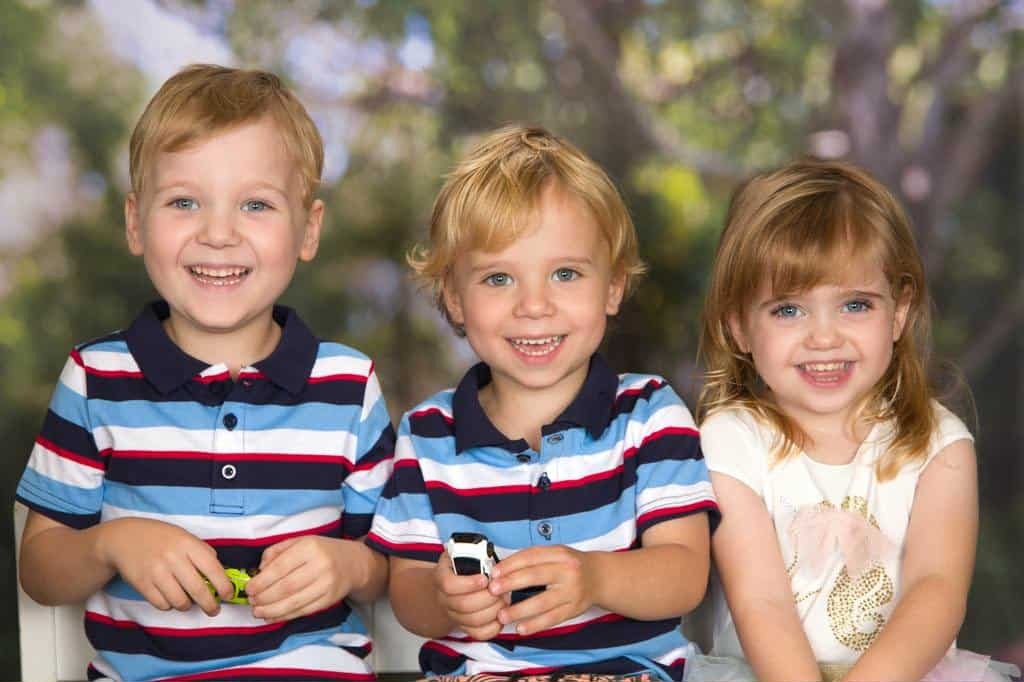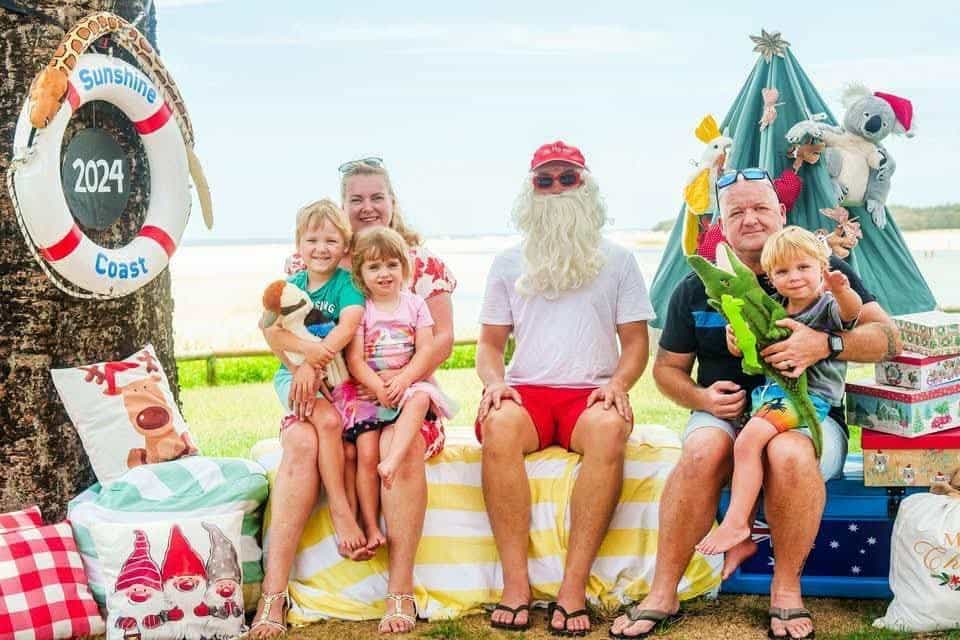Liz Buckley-Stokes had always wanted to be a mother, but she met her husband a little later than expected, so it wasn't until her late 40s that she decided to try to have children.
After two failed rounds of in vitro fertilisation — or IVF — a doctor recommended that Buckley-Stokes starts looking for donated eggs.
She and her husband signed up with Egg Donation Australia, a support group that connects potential donors with people looking to become parents through an online forum.
It was an odd environment that felt almost like a dating site, she says, and the process of trying to find a donor was upsetting.
"It's really hard because you're putting yourself out there and you get nothing in return," she says.
"It is actually really soul-destroying," Buckley-Stokes says.
She says the exhaustion of putting personal information online for others to assess was compounded by the anxiety that she may never become a mother.
"You're thinking that you're never going to be a mum and you're never going to have that chance because no-one is responding to your advert," she says.
After around six months, Buckley-Stokes and her husband managed to meet a donor through the forum and underwent one round of IVF treatment using her donated egg, which was unsuccessful.
However, the donor introduced them to another woman, Jess, who ultimately donated eggs that led to three successful pregnancies.
Jess had undergone IVF herself and, Buckley-Stokes explains, she wanted to donate eggs because she "understood the process and she understood the heartbreak".
Now raising Robbie, 6, and twins Jessie and Luke, 4, Buckley-Stokes runs a Facebook group for donors and hopeful parents looking to connect.
She considers herself lucky to have found a donor and says watching others wait months or even years to find donated eggs is deeply distressing.
"It's really hard and it breaks my heart when I hear their stories," she says.
There's not a lot more than I can do apart from just give them the support and give them the platform.
According to Monash IVF, the supply and demand ratio between donors and hopeful parents in Australia is 1:52 — meaning one donor for every 52 hopeful parents.

Many are now calling for changes to how egg donation is incentivised — and even compensated.
Growing demand
Since the first IVF-conceived babies were born in the early 1980s, Australia's fertility industry has boomed.
Around one in every 16 babies born in Australia is now conceived via IVF. For women aged 35 and older, the figure is closer to one in 10.
The demand for donated eggs is also growing and far outstrips the supply.
Karin Hammarberg, a senior research fellow at Monash University's School of Public Health and Preventive Medicine, says this disparity is increasing as people postpone having children.
"Women are starting to try for a baby later in life and that results in more women finding it difficult to conceive," Hammarberg says.
"The need [for eggs] is increasing and the supply is not increasing, so there's a larger and larger proportion of women who need it but can't access it here."
Those looking for donated eggs can find them in one of two ways: through personal connections or through IVF clinics. The majority of pregnancies achieved using donated eggs in Australia are the result of personal connections, with women donating eggs to same-sex partners, family and friends.
While the exact number of people waiting for donated eggs in Australia is unknown, a survey from The University of Melbourne, published last year, found that out of 59 women placed on an egg donation waiting list at an IVF clinic, only 13 received a donor egg.

Hammarberg says it's likely many women would be deterred from donating eggs because of how invasive the procedure can be and its physical demands.
"To imagine that women out of just pure generosity would sign up to donate eggs to anyone and go through that procedure for no kind of compensation whatsoever is — I think — asking a lot," she says.
'Reproductive tourism'
The lack of available eggs in Australia has driven many who dream of becoming parents to what is known as 'reproductive tourism' — buying eggs and undergoing IVF overseas.
South Africa, Argentina, Spain, Greece, Russia, Asia, Canada and the United States are common destinations for Australians seeking out these services.
However, laws and ethical standards of gamete (egg and sperm) donation can differ markedly in overseas markets. For example, sex selection for non-medical reasons is legal in the US but not in Australia.
Many other countries also do not have laws ensuring children born using donor gametes are able to contact their biological parents after turning 18, as is the case in Australia, depending on the rules of the specific state or territory.
This can present deep ethical challenges for children born using gametes sourced from overseas.
In 2016, Victoria became the first jurisdiction in Australia to legislate that all donor-conceived people should have the opportunity to receive information about their sperm, egg or embryo donors.
Narelle's Law was named after Narelle Grech, a woman who was conceived by sperm donation and died in 2013 from hereditary bowel cancer. She had spent 15 years searching for her donor.
Hammarberg says Australia needs to reconsider its treatment of altruistic egg donors to try and meet the growing demand.
"We have to face up to the fact that [women travelling overseas for donor eggs] is the consequence of the system we have now and then think of ways of perhaps making it a bit more appealing for women to donate their eggs," she says.
'We need to find a middle ground'
With demand consistently outpacing supply, many experts in Australia have raised questions about the legal restrictions that prevent donors from receiving financial compensation for their eggs.
While in other countries, such as the US, donors can be paid a significant sum for eggs, Australian laws state that gamete donation must be altruistic, and any direct or indirect inducements are illegal.
However, reimbursement for out-of-pocket expenses, such as medical and counselling costs, travel and accommodation, loss of earnings, insurance, childcare costs, and legal advice, is permitted.
The National Health and Medical Research Council guidelines on assisted reproductive technology say this position "reflects concerns about the potential exploitation of donors [particularly egg donors] and the potential risks to all parties".
Research has found the US system of allowing women to sell eggs — which can go for tens of thousands of dollars — can disproportionately target young and financially insecure women.
While she acknowledges the ethical complexities of paying women to donate eggs, Hammarberg says she has concluded that Australia may need to allow some financial incentive to do so.
In the United Kingdom, women are not paid directly for altruistic egg donation; however, donors can receive standardised compensation of up to £986 ($2,021) for each cycle to cover their costs. Additionally, women can claim extra compensation for expenses such as travel, accommodation, and childcare.
Hammarberg believes that while women should not be paid directly for their eggs, Australia should consider a similar model to recognise women's contributions with a set amount of compensation.
"I've come to the conclusion that we need to find some kind of middle ground here because there is clearly a supply and demand issue," she says.
Hammarberg also notes that while women can't be compensated for egg donation in Australia and the vast majority of IVF clinics are private, it creates a bizarre situation where women donate altruistically, but clinics are able to profit from them.
Everyone gets paid — the doctor gets paid, the clinic gets paid — everyone gets paid but not the donor.
The IVF clinic at the Royal Women's Hospital in Victoria is one of only a handful of public fertility clinics in the country, established under the Victorian government's Public Fertility Care service.
The clinic offers altruistically donated gametes free of charge to eligible persons seeking public fertility care.
Associate Professor Wan Tinn The, a fertility specialist from the hospital, tells SBS News a number of "very generous" people have donated eggs to this program, but says "the supply is still not enough for the demand".
Hammarberg says this type of contribution needs to be recognised.
"I think this needs to be something where there's some kind of compensation that's not an incentive to donate just for the sake of money, but some kind of respectful recognition of the effort that's involved in being an egg donor," she says.
100,000 in storage
Despite a lack of donors, there are lots of eggs in Australia that could be used to plug the gaps in donation — in fact, there could be thousands.
Experts believe that more women who have undergone elective egg freezing could be incentivised to donate unused eggs.
Australia's IVF industry is facing a mounting issue of surplus frozen eggs. One study that examined ten years of egg freezing at Monash IVF clinics in Victoria found less than 13 per cent of patients returned to use their eggs each year.
It's estimated that approximately 100,000 eggs are currently sitting in storage around Australia.
While the decision to donate these unused eggs can be morally and emotionally fraught, Lucy Caughey, a behavioural research scientist from The Royal Women's Hospital who examines decision-making around egg freezing, says women need more information.
"Ideally, we should be seeing transparency from the beginning, including information on open identity donation, the egg shortage in Australia, age criteria, and the impact of donating your eggs to others," she says.
Experts also argue women could be paid back for the cost of storage if they donate.
Stephen Page, a fertility law expert and board member of the Fertility Society of Australia and New Zealand, tells SBS News the Commonwealth legislation, which refers to the commercial trading of eggs, should allow women to be compensated for the cost of already-frozen eggs as a "reasonable expense" of donation.
Page believes Australian women should be able to access some compensation both for undergoing egg retrieval for donation and donating already frozen eggs.
"What that means is that we're less inclined to import eggs from overseas and more inclined for the child, therefore, to be able to find who the donor is because of the transparent nature of donation in Australia, [because it] is someone local — not on the other side of the world," he says.
Buckley-Stokes says while she's unsure of what policy changes could increase the number of donors, she wants more open dialogue about egg donation and the enormous benefits it can provide to people looking to start families.
"At the end of the day, they're actually doing it to help someone," she says.
I think that's the biggest conversation that needs to be had: is educating women on the impact.
For the latest from SBS News, download our app and subscribe to our newsletter.

